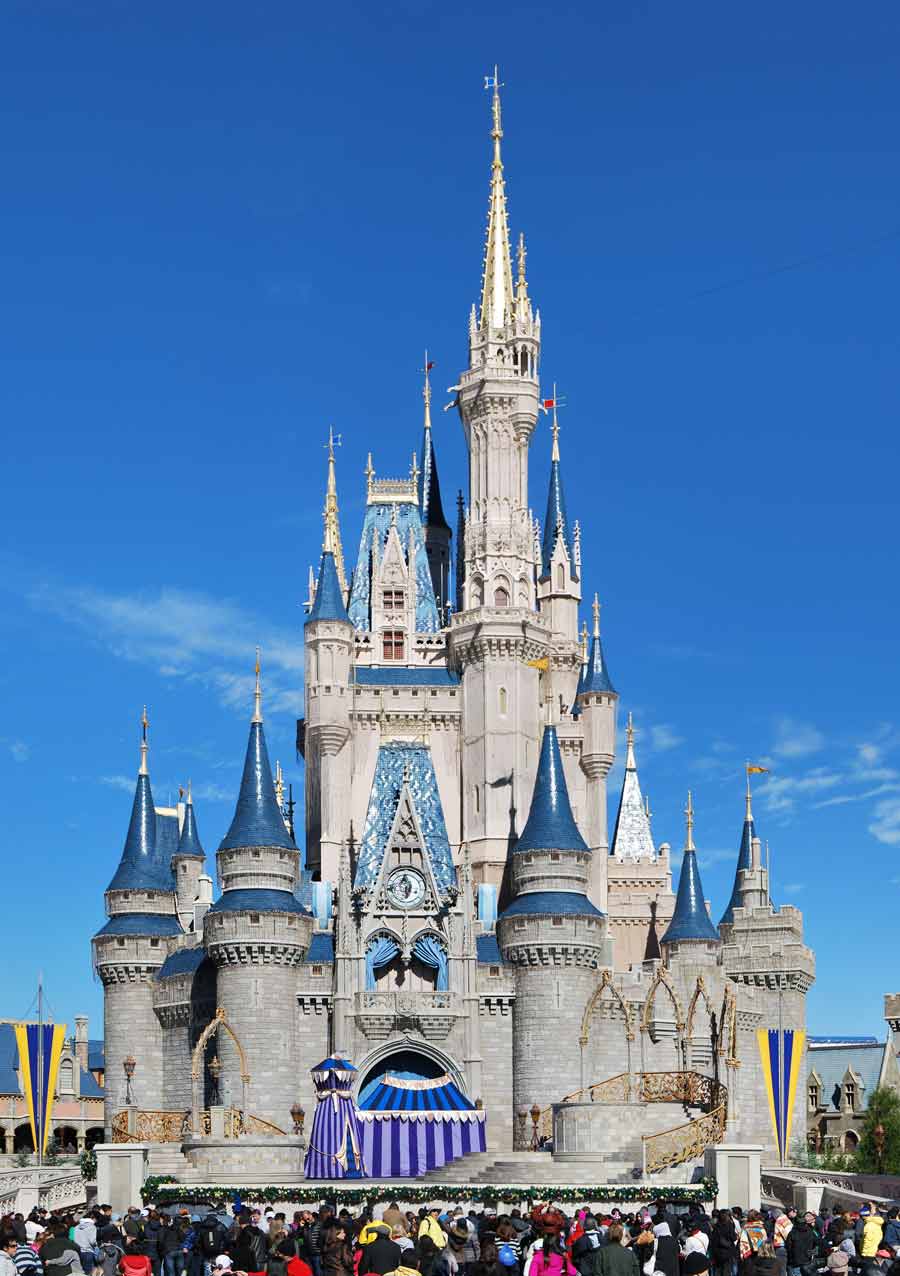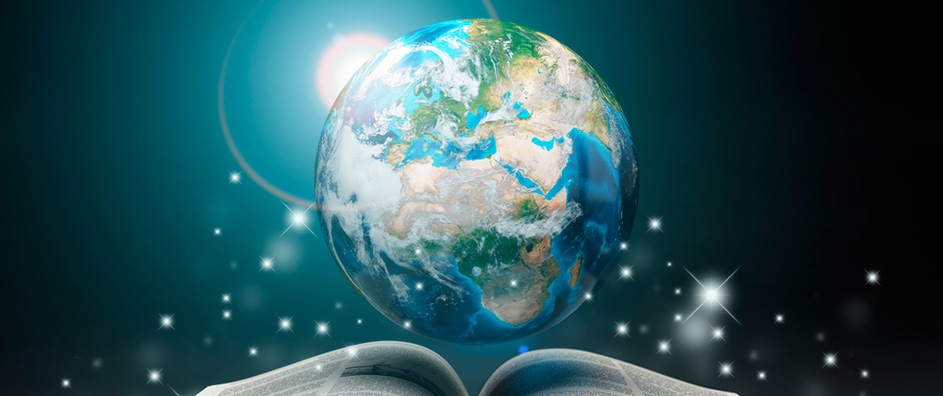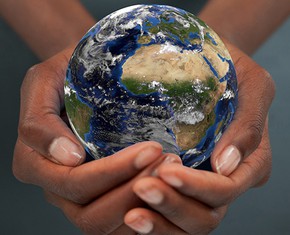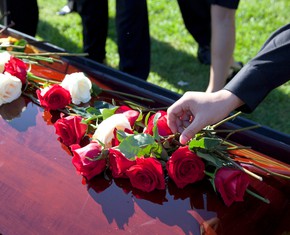The views expressed in our content reflect individual perspectives and do not represent the authoritative views of the Baha'i Faith.
Where can you find the happiest place on Earth, or the most magical place on Earth? If you guessed a Disney theme park, you definitely know the marketing slogans.
Magic Kingdom Park, the first-built of the four theme parks near Orlando, Florida, opened on October 1, 1971. Its layout and attractions mimic the original Disneyland—“the happiest place on Earth—in Anaheim, California, which opened in 1955. In 2014, Florida’s Magic Kingdom Park—“the most magical place on Earth”—hosted 19.3 million visitors from around the globe, making it the world’s most visited theme park for the sixth consecutive year.
 The Park’s most iconic structure—Cinderella Castle, inspired by the fairy tale castle seen in the 1950 Disney animated film—has become known worldwide as a symbol of the Magic Kingdom.
The Park’s most iconic structure—Cinderella Castle, inspired by the fairy tale castle seen in the 1950 Disney animated film—has become known worldwide as a symbol of the Magic Kingdom.
I saw a smaller version—the original Sleeping Beauty’s Castle—at age 15, when a high school buddy with a driver’s license and an open-air Jeep drove us three friends to Disneyland, purportedly to meet girls. We danced the Watusi and the Twist on the stage together under a large open-air canopy, then rode under Space Mountain and reveled in the excited faces of adults, youth and especially children.
The price of admission was $4.00 each, much more than the twenty-five cents a gallon to drive the thirty miles there and back. Today, plan on paying about $100 per person per day to feel happy or magical.
As glorious and thrilling as Disneyland seemed to my 15-year-old self, its ersatz colors, costumes, attractions, and stands of every kind from food to souvenirs pale before the real thing. The diversity of humanity and of nature itself, and then of man’s creations and myriad wonders, all outstrip any mere amusement park’s imitations. Even our creature comforts, from running water and toilets and the systems that support them, to appliances run by gas and electricity in hundreds of millions of homes and facilities, to solar-powered rooftops and vehicles—they all exceed any fantasy reality we’ve managed to create.
So while millions of people have enough good fortune to afford tickets to the Theme Park of the Good Life, billions of people are still excluded.
In truth, the greatest Magic Kingdom ever created is the Earth we co-inhabit with nature and its unnumbered creatures. Are we cherishing its beauties and benefits as much as we cherish our man-made creations?
In this age of transition toward a world society, protection of the environment and conservation of the earth’s resources represent an enormously complex challenge. The rapid progress in science and technology that has united the world physically has also greatly accelerated destruction of the biological diversity and rich natural heritage with which the planet has been endowed. Material civilization, driven by the dogmas of consumerism and aggressive individualism and disoriented by the weakening of moral standards and spiritual values, has been carried to excess
Only a comprehensive vision of a global society, supported by universal values and principles, can inspire individuals to take responsibility for the long-term care and protection of the natural environment. Baha’is find such a world-embracing vision and system of values in the teachings of Bahá’u’lláh – teachings which herald an era of planetary justice, prosperity and unity. – Statement from the Baha’i International Community on Conservation and Sustainable Development
Baha’is believe that humanity is up to this challenge. I won’t iterate the consequences if we fail, since all enlightened societies are more than familiar with them. Under-developed and developing nations, caught between using up their natural resources for bare survival and economic realities, are beginning to understand as well. The Kyoto Protocol established in 2005 represents a good basis toward finding amenable, worldwide solutions.
It’s a simple matter of stewardship for this trust mankind has been given, our very planet itself.
Many countries, mine included, have established Environmental Commissions at the local and regional levels to meet this challenge. Where I live in New Jersey, we have over 350 such local and regional commissions. These commissions review developers’ plans to build homes, businesses and commercial facilities.
You may be unfamiliar with such grassroots organizations in your community, but they all have been established to provide balance between construction and development and open spaces, forests, streams and wetlands. The balance they strive for, the Baha’i teachings say, aims to curb the excesses that threaten to permanently harm our environment:
The civilization so often vaunted by the learned exponents of arts and sciences will, if allowed to overleap the bounds of moderation, bring great evil upon men… If carried to excess, civilization will prove as prolific a source of evil as it had been of goodness when kept within the restraints of moderation… – Baha’u’llah, Gleanings from the Writings of Baha’u’llah, pp. 342-343.
It’s time we all held a ticket to the magic kingdom, to the happiest place on Earth: life and peace, fresh water and clean air, sunshine and moonfall, justice and fairness, pay equality and work for all, the abolishment of slavery and domination by the elite. The time has come for that blessed day when we trust each other to do the right thing, and actually do the thing right.
Are there things you are doing in your home or local community to steward the resources you’ve been given?
















Comments
Sign in or create an account
Continue with Googleor